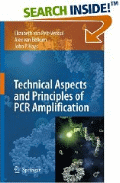|

|
Elizabeth van Pelt-Verkuil, Alex van Belkum, John P. Hays
Principles and Technical Aspects of PCR Amplification
Kary Mullis was awarded a Nobel Prize for inventing the PCR technique more than 15 years ago in 1993. Since its "discovery", multiple adaptations and variations of the standard PCR technique have been described, with many of these adaptations and variations currently being used in clinical, diagnostic and academic laboratories across the world. Further, these techniques are being applied at the diagnostic level (e.g. as high throughput testing methodologies to detect minimum residual disease, the presence/absence of specific pathogens etc), as well as to increase our understanding of fundamental disease processes. Frequently, PCR technicians and specialists limit their understanding of PCR to one particular methodology. However, this approach limits their appreciation of the range of versatile PCR techniques currently available, techniques that may be applicable and indeed more suitable to their own laboratory situation. This manual aims to provide the reader with a guide to the standard PCR technique and its many available modifications, with particular emphasis on the role of PCR techniques in the diagnostic laboratory (the central theme of this manual). Further, many important technical issues have been addressed, including types of PCR template material, PCR optimization, the analysis of PCR products, quality control and quality assurance, variants and adaptations of the standard PCR protocol, quantitative PCR and in situ PCR. The reader of this manual will be excellently informed about the fundamental principles of PCR and the true potential of PCR within clinical laboratory practice.
Springer; 2008
|



